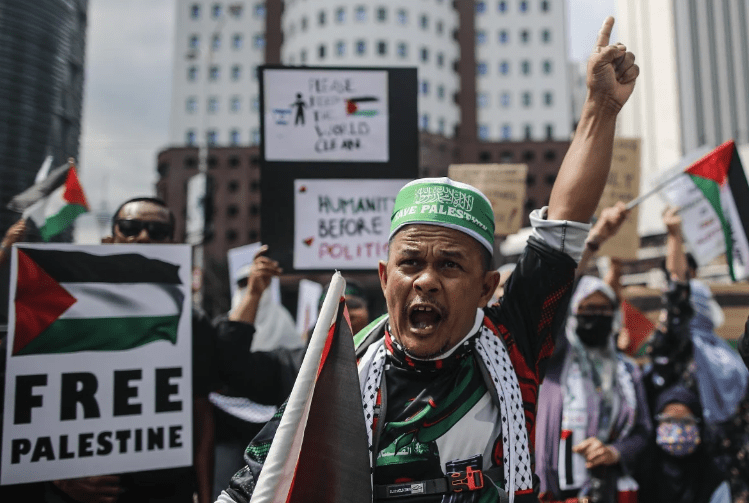Support for Hamas in Southeast Asia conflicts with opposition to terrorism

Government endorsement of the militant organisation’s narrative without condemning its terrorist violence against Israeli citizens risks fuelling radicalisation
Jews in Southeast Asia are living in fear, and countries must stop supporting militant groups and eliminate inter-religious hatred in their societies
In December, Malaysia moved to bar Israeli-flagged or Israel-bound commercial ships from Malaysian ports. Many Malaysians have also boycotted businesses and products associated with or supporting Israel.
Malaysia stands out as a rare example – apart from Iran and its Middle Eastern proxies – of a country showing unqualified support for Hamas and its narrative. Prime Minister Anwar Ibrahim has resisted calls from the West to withdraw support for Hamas in the wake of its October 7 attack on Israel.
Anwar’s strong support for the Palestinian cause can be traced to his university days. While the support might be genuine, it has become embroiled in the politics of a coalition government and opposition parties vying for the votes of the Muslim majority.
Continued government endorsement of the militant organisation’s narrative without condemning its terrorist violence against Israeli citizens risks fuelling radicalisation among Malaysian youth and children. In October, during Malaysia’s Palestinian Solidarity Week, some teachers and students wore Palestinian keffiyehs and held toy guns, apparently emulating Hamas’ armed resistance against Israel. Following condemnation by activists, Anwar announced increased controls on such activities during state-led programmes.
Indonesia, the world’s most populous Muslim-majority country, has also refrained from condemning Hamas. The Indonesian Ulema Council, the country’s top religious body, issued a fatwa in November supporting the Palestinian struggle for independence and condemning Israeli aggression. The decree calls for an Indonesian boycott of Israeli-associated products.
Such religious decrees are likely to inflame sentiments not only against Israel but also Indonesia’s Jewish population. Indonesians struggle to differentiate between the Israeli government and Jews, even those outside Israel.
Despite calls for calm and reducing inter-religious tensions, the Jewish community of Indonesia lives in fear. This situation is unsurprising in a country that does not recognise Judaism as a religion as a result of which Jews feel forced to use Christianity in their identity documents.
Another case is that of Pakistan, where Muslims make up more than 96 per cent of the country’s 240 million people. A recent Gallup survey revealed that 91 per cent of Pakistani respondents sympathised with the Palestinians of Gaza, with just 2 per cent sympathising with Israel.
Despite expressions of concern by caretaker prime minister Anwaar-ul-Haq Kakar and the foreign office about the escalating violence in the Middle East, there was a notable absence of condemnation or mention of Hamas’ October 7 attack. Pakistan’s army chief General Asim Munir has rejected labelling Hamas’ armed resistance as terrorism, arguing it would disregard the prolonged oppression of Palestinians by Israel.
Parallels can be drawn between Pakistan’s position on this issue and on the armed struggle of Kashmiris against India’s control. Islamabad views the Israel-Palestine conflict through the prism of the Kashmir issue, vehemently opposing violence by Israel and seeing resolution in Palestine as paving the way for the resolution of the Kashmir issue.
The country’s largest religio-political organisations, Jamaat-e-Islami and Jamiat Ulema Islam, publicly support Hamas and have hosted its leadership or visited it in Doha, even during the Israel-Hamas conflict. While public protests in Pakistan might have avoided “death to Israel” slogans, newspaper op-eds have expressed strong anti-Jewish and anti-Israel sentiment.
From Pakistan’s perspective, a global pressure campaign on Israel over the Palestinian issue could set a precedent for a similar campaign on India regarding the Kashmir dispute.
However, with Arab countries strengthening ties with India, the likelihood of comparable pressure on India appears slim. Several Arab countries, including Saudi Arabia and the United Arab Emirates, oppose Hamas and similar Islamist outfits with a militant political ideology. Some Arab nations explicitly condemned Hamas’ October 7 terrorist attack.
The primary motivation behind their strong stance against Israel’s military operation in Gaza is the recognition that Israel’s occupation and settler violence pose a significant threat to regional peace, providing openings for Iran and its proxies to destabilise the region. Arab countries understand that resolving the Palestinian issue is crucial for their long-term visions of industrialisation and economic diversification.
Despite massive public opposition to Israel’s actions in the Arab world, a survey by Princeton University’s Arab Barometer revealed that 90 per cent of respondents in Arab countries, including Algeria, Egypt, Iraq, Jordan, Libya and Tunisia, disapproved of militant outfits and their violent methods. The public opinion and the government response in Arab countries reflect a broader acceptance of diversity, with leading Arab countries focused on scientific and economic development.
Meanwhile, some South and Southeast Asian countries persist in outdated and failed strategies of promoting militant religious ideologies for political objectives. Their failure to condemn Hamas’ actions ingrains radicalisation and normalises armed resistance against occupying forces.
Countries must stop supporting militant groups such as Hamas and eliminate inter-religious hatred in their societies. Shifting the focus towards rational thinking and pursuing scientific and economic achievements is essential to diverting the population from the destructive path of violent religious extremism.
Finally, Hamas called its attack a “flood”, knowingly provoking a response that has hurt Palestinians. The group now aims to capitalise on the humanitarian crisis caused by Israel, which in reality resulted from Hamas’ actions.
Hamas should be condemned for bringing this tribulation upon the Palestinian people. It is perplexing why people in many Islamic countries fail to see this clearly.






